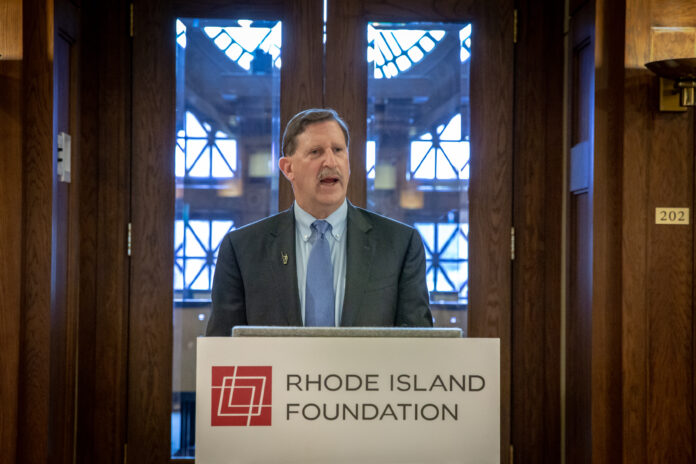
PROVIDENCE – Within the last two years, Rhode Island has started making the long journey to repair the public education system in the state.
In 2018, the $250 million school construction bond initiative introduced by Gov. Gina M. Raimondo in her budget, in which voters subsequently approved the bond measure in November of that year. Close to a year later, not long after Angelica Infante-Green became the state’s new education commissioner, the R.I. Department of Education took control of the Providence Public School District after a scathing report by the Johns Hopkins Institute for Education Policy highlighted how the capital city’s school district was failing in multiple aspects, including students struggling to learn and crumbling school infrastructure.
Neil D. Steinberg, Rhode Island Foundation’s CEO and president, views this scenario as a “moment in time” and an opportunity that the state needs to capitalize on if the Pre-K-through-12 public education sector wants to become world-class.
He and a group of area stakeholders in the business and education sectors now have a plan to improve education in the Ocean State.
The foundation announced Thursday it will be committing $1 million to support improvements to Rhode Island’s public education system, as well as introduced a 10-year plan that offers various recommendations and strategies for improvements.
In an interview Tuesday, Steinberg said the foundation was looking at education around the time when the Rhode Island Comprehensive Assessment System scores were being implemented approximately 18 months ago – scores that in 2018 showed Rhode Island students performed poorly in math and English language arts.
“We didn’t have a vision or a strategic plan,” Steinberg said.
In the fall of 2018, the foundation formed a group to help craft a long-term vision on Rhode Island having an elite education system. The 26-member group, which includes Steinberg, R.I. Education Commissioner Angelica Infante-Green, National Education Association Rhode Island Executive Director Robert A. Walsh Jr., Rhode Island KIDS COUNT Executive Director Elizabeth Burke Bryant and Partnership for Rhode Island Executive Director Tom Giordano, met monthly for 14 months to develop a strategy that not only mirrors what nearby Massachusetts has done to improve its respective education sector but also possibly surpass the Bay State.
“One of my favorite quotes from the commissioner [Infante-Green during the discussions] was ‘we don’t want to be Massachusetts. We want to beat Massachusetts,’” Steinberg said.
The plan
Titled “Chart a Course, Stay the Course: Rhode Island’s Path to a World Class Public Education System,” the 21-page plan outlines four priorities – high standards, educator support, investment priorities and clear governance – with 20 strategies and 19 suggested next steps accompanying the priorities. Input for the plan was provided by more than 300 parents, students, educators, policymakers and leaders from the nonprofit and for-profit sectors during Rhode Island Foundation’s Make It Happen RI brainstorming session held in early December at the R.I. Convention Center.
One of the strategies the plan outlines to reexamine and address barriers preventing “recruitment and retention of racially, ethnically and linguistically diverse educators.” Steinberg said that many people would say students “will respond better” when there’s a diverse group of educators that they can relate to.
“Some of the areas where we have high-degree or high percentage of [minority] students, the teacher workforce, not to the fault of anybody, that grew up here are older and whiter. We need to get more [diverse] people into teaching,” he said. Steinberg also noted that Providence-based nonprofit EduLeaders of Color RI – where co-founder and chief connector Carlon Howard was part of the group that put the plan together – also helps promote diversity in the education sector.
Another noted strategy in the plan is the group is calling for looking into issues regarding “recruitment and retention methods for hard to fill teaching areas.” Steinberg said the group referred that to a growing need of special education teachers and addressing a shortage of teachers specialized in science, technology, engineering and mathematics – or STEM.
Other strategies the plan suggests addressing are the education sector needs to “sustain a rigorous statewide assessment system which Steinberg noted that the state has historically changed how it does its standardized testing and it needs to “be consistent”; modify the existing funding formula “to align with state and local priorities”; leverage partnerships with various organizations in the business, community and social-service sectors to “supplement investments in public education”; and modify existing clauses within the Rhode Island Constitution to “best protect and serve students.”
The $1 million – which the foundation said is “above and beyond” its typical grantmaking for education – is not specifically earmarked for the R.I. Department of Education, but Steinberg hopes the funds, which can be applied for, can be used statewide. Additionally, Partnership for Rhode Island committed $100,000 toward the initiative, Steinberg said.
Steinberg met earlier this week with Raimondo, House Speaker Nicholas A. Mattiello and Senate President Dominick J. Ruggerio to discuss the plan to get the word out about it on Smith Hill, he said. He also met with the Greater Providence Chamber of Commerce Education Council earlier Tuesday and plans to talk about the plan in his keynote address at the East Greenwich Chamber of Commerce’s annual meeting Thursday night to hopefully get the various business sectors on board with the plan.
“Imagine 10 years from now, we have a world-class education for our students, and we have one of the healthiest states in the U.S.,” Steinberg said. “We would then not have to do major recruiting, in my mind. Companies would flock here. It’s that important to the students that are here today. It’s that important to the future of the state that we be competitive, provide the workforce.”
James Bessette is the PBN special projects editor, and also covers the nonprofit and education sectors. You may reach him at Bessette@PBN.com. You may also follow him on Twitter at @James_Bessette.












